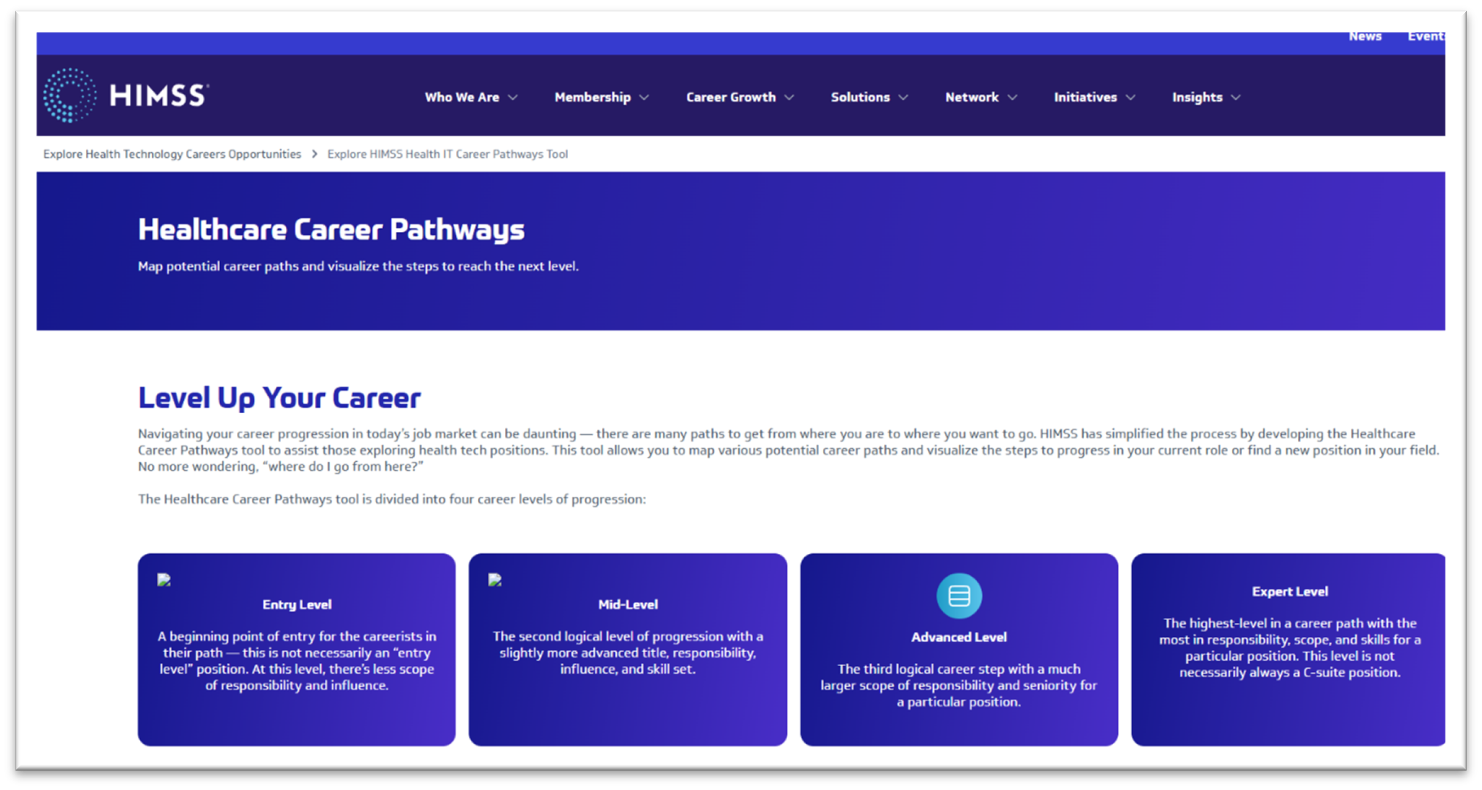Utilizing Resources Available Through Campus Career Centers to Prepare for and Start Your Career

Wil is a Program Director – Health Documentation Access and Associate Instructor for UW Health & UW Stevens Point and currently serves as a member of the HIMSS Professional Development Committee.
Unlocking Career Success: Why HIMSS Students Should Tap into Campus Career Services
As a HIMSS (Healthcare Information and Management Systems Society) student, your technical skills are likely top-notch. You've spent countless hours mastering data analytics, healthcare IT systems, compliance, and coding. But when it comes to landing that first job—or stepping up into a more advanced role—technical ability alone won’t always open the right doors. That’s where your school’s career services department can become a game-changer.
Many students underestimate the value of these services, thinking they’re only useful for résumé templates or mock interviews. In reality, your campus career center is a powerful ally, offering a range of resources tailored to help you transition from classroom to career with confidence. For HIMSS students navigating a competitive and evolving job market, leveraging these services can make all the difference.
According to Lee Burke, Career Coach in the Academic and Career Advising Center on the University of Wisconsin-Stevens Point Campus, “I have been in my role for six years and over that time there are two types of students I typically see – those who are very prepared and are looking for reassurance that they have everything ready and those who are feeling lost or struggling.”
Tailored Career Planning
Campus career service departments aren’t just about generic advice — they’re equipped to help you build a personalized career plan. Whether you’re exploring clinical informatics, data governance, cybersecurity, or healthcare project management, a career advisor can help you clarify your goals, identify emerging job trends in the HIMSS space, and map out actionable steps to get there. They often have insider knowledge on which certifications and specializations are most in-demand, helping you stay ahead of the curve.
Burke encourages students to participate in ‘Motivational Interviews’ to help align your interests with the job you are seeking. For the second type of student who may be struggling, “We ask them what they liked about their major? Why were you interested in the major to begin with? What did you like about your course work?” Burke said, “I get them to tell me their story. Then we do a gap analysis. What skills do they already have and what is missing based on job descriptions they may be interested in. I tell students, ‘Do not judge a job by the title. ’It is more important to read the job duties and match their skills with what is expected of the job. Organizations can use different titles for the same job.”
HIMSS offers tools to help career seekers narrow their search as well. These resources have been vetted by industry leaders representing all areas of Health IT as well as Health Information Professionals. These resources include the Healthcare Career Pathway Tool, the HIMSS JobMine, a comprehensive listing of Health Information and Technology Job Descriptions and don’t forget the CAHIMS and CPHIMS exam prep tools and the candidate handbooks all located on the HIMSS.org website.

Burke also suggested that all job seekers complete O ’Net’s Interest Profiler, especially if they are unsure about their career path. It is a 60-question survey created by the Department of Labor that takes minutes.“ It will evaluate your responses and suggest careers that match your interests. Along with the specific careers suggested for you, it will also include similar career ideas.”, according to Burke.
Résumé and LinkedIn Optimization
In tech-focused fields like HIMSS, your résumé needs to do more than list your qualifications—it needs to tell a story that aligns your skills with the needs of today’s healthcare employers. Career services professionals can help translate your technical jargon and the skills you learned through your degree and other experiences into impactful bullet points that catch the attention of hiring managers.
Many campus career centers also offer LinkedIn workshops, helping you craft a professional online presence that can attract recruiters in the digital health space. Resume and LinkedIn profile review sessions are offered during HIMSS’ Annual Global Conference free of charge for those who sign up for the review service. Industry professionals volunteer their time during the Global Conference to talk with and share enhancement ideas with new career seekers and those looking to advance careers. Some HIMSS state and local chapters also offer similar services at their events. Make sure that your Linkedin profile is up-to-date and accurate and if you’re open to employment, add that feature so employers can find you.
Interview Preparation and Networking
Even the most qualified candidates can struggle to communicate their value in an interview. Career services departments offer mock interviews tailored to your field, often with feedback on how to articulate your experience with EHR systems, HIPAA compliance, or analytics tools like SQL and Tableau. In addition, they can help you tap into alumni networks and professional connections — some of whom may already be working in the organizations you hope to join.
Burke noted, “Soft skills or what are often called ‘employability’ skills – things like communication, teamwork, critical thinking, which are aligned with the NACE Career Readiness Competencies. These competencies are fairly universal across any industry (even if they show up differently) and can sometimes be harder for a student/young professional to articulate than their own technical accomplishments are.” Burke noted, “It helps to practice your answers to be prepared so you don’t miss these important skills. We have found on our campus that folks for whom English is not their first language may not be familiar with the term ‘mock’ interview .In our office, we tend to use ‘practice’ interview to help students prepare.”
Exclusive Job Opportunities
Many schools partner directly with employers looking to hire recent graduates or interns. Career services often have access to job boards and listings not publicly available elsewhere. For HIMSS students, this might mean access to internships at hospitals, insurance companies, health tech startups, or government health agencies—experiences that could become steppingstones to long-term employment.
The schools in the UW System use a program called Handshake to post job opportunities. Burke said, “Students and alumni have access to Handshake where they can sort jobs multiple ways. By company, by title and even by the major the job will accept. Some job postings are specific for what major they are looking for, but many align with multiple majors that may not be obvious. We use Handshake. Other schools may use similar tools, but those types of tools are pretty universal and are available to students and alumni 24/7.”
HIMSS JobMine and state and local chapters offer similar access to job postings and must not be overlooked.
Workshops and Employer Events
Career centers regularly host career fairs, employer panels, and industry talks. Attending these events gives you the chance to hear directly from professionals in the field, gain insights into the hiring process, and make valuable connections. For those looking to move into leadership roles or pivot into new sectors within health informatics, these sessions can provide the strategic guidance you need.
Burke said each school is different depending on the resources available. UW Stevens Point’s Career Office hosts two career fairs annually. All students are invited, but alumni are invited up to one year after graduation. Burke said, “Our office of three can support one year. Other offices on other campuses may have more resources and can support alumni longer. Other areas on campus also host specific job fairs for their departments that are specific to that area. Students need to check out the resources on their campus because they can vary.”
Final Thought
Your degree gives you the technical skills; your career services department helps you turn them into an opportunity. Whether you're preparing for your first job or aiming to advance, don’t wait until graduation to take advantage of these free, expert resources. Success in HIMSS isn’t just about what you know — it’s about who helps you get to where you want to go. Career Seekers are encouraged to take advantage of all resources available including, but not limited to HIMSS' local, state, national and global opportunities, but the resources they use to help them launch their career or take it to the next level, must also include the career services office on campus.
Burke’s parting advice to all job seekers, “It is most likely that the staff on your campus have created on-line access to resources. Job seekers do not need to come into the office to take advantage. UW Stevens Point has practice interview tools and links to other resources ready 24/7 so those students up at 2 AM can use them. Alumni have one year to take advantage of on-campus support, but they have access indefinitely to the on-line resources like Handshake and most people are not aware these resources exist.” Burke ended with, “…And have more than one person review your resume.”